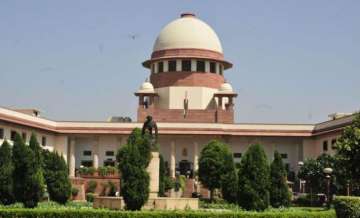Hearing over a clutch of pleas challenging re-criminalisation of consensual gay sex between two adults - IPC's Section 377, the Supreme Court on Tuesday witnessed intense arguments between Mukul Rohatgi and Additional Solicitor General Tushar Mehta, who is representing the Centre in the matter.
Appearing for the petitioners, former Attorney General Mukul Rohatgi, argued that Section 377 violates one's human rights. "The issue deals only with sexual orientation and it has nothing to do with gender," Rohatgi said, adding, "As society changes, values changes we can say, what is moral 160 years ago might not be moral today."
"This is a case of constitutional morality vs others. This case has a large ramification. Issue of gender and sexual orientation are two different things. These two issues should not be mixed up. This is not question of choice," he added.
Appearing in the court for one of the petitioners, senior lawyer Arvind Dattar told the court that if Section 377 was enacted today, it wouldn't have withstood the test of constitutionality. "If a person has a different sexual orientation, it can't be treated as a crime. This can't be treated as against the order of the nature," he said.
Responding to this, the top court told Dattar to convince it that that a law like Section 377 won't be sustainable in present day circumstances.
Additional Solicitor General Tushar Mehta, representing the Central, told the Supreme Court that the government will file it's response later today.
The hearing in the Supreme Court on the pleas seeking scrapping of Section 377 will continue tomorrow.
The five-judge Supreme Court bench headed by Chief Justice Dipak Misra and comprise Justices R F Nariman, A M Khanwilkar, D Y Chandrachud and Indu Malhotra had earlier refused to grant four weeks time to Centre to file its reply to the petitions and the hearing be adjourned.
The apex court had in 2013 had restored the criminality of the sexual relationship between persons of the same sex, after the Delhi High Court' had decriminalised it in 2009.
When the top court had set aside the high court judgement decriminalising sex between consenting adults of same sex by holding Section 377 of IPC as "illegal", review petitions were filed.
On their dismissal, curative petitions were filed by the affected parties for re-examination of the original verdict.
Several other fresh petitions, including a plea by a group of 20 former and current students of the prestigious IITs, were also filed seeking restoration of the Delhi High Court verdict in the case.
The Supreme Court had on January 8 referred to a five-judge constitution bench, several pleas filed by eminent citizens and NGO 'Naaz Foundation' challenging the 2013 apex court verdict which had re-criminalised gay sex between consenting adults. It had also sought a response from the government.
(This is a developing story as the hearing is underway in the honourable Supreme Court)
(With inputs from agencies)
Latest India News
